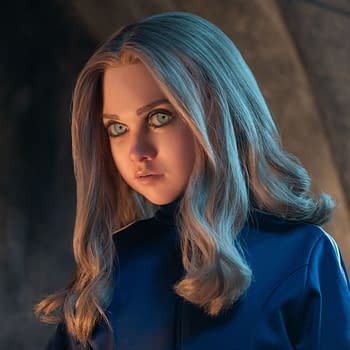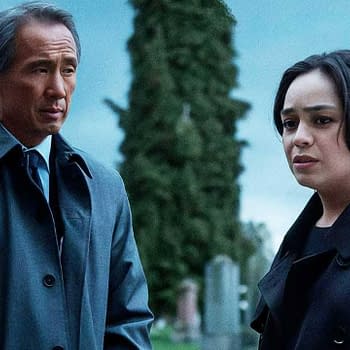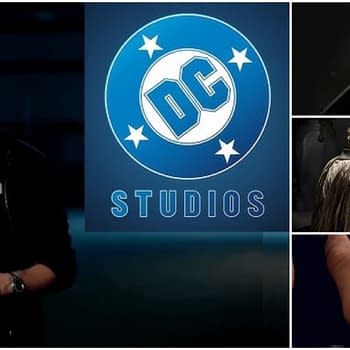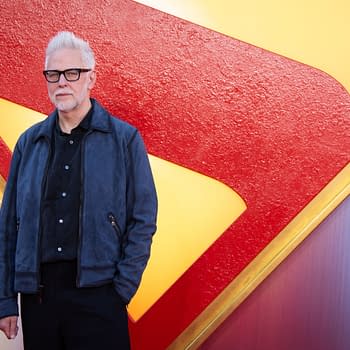Posted in: Movies | Tagged: entertainment, indie film, Kyle Roberts, Matthew Price, sterling gates, superheroes, The Posthuman Project
Sterling Gates Talks Indie Superhero Film The Posthuman Project, Plus Exclusive Clip
By Nikolai Fomich
Fresh off the film festival circuit and a limited theatrical run throughout Oklahoma and Texas, the critically acclaimed indie superhero film The Posthuman Project is now available on multiple Video on Demand platforms, including iTunes and Amazon. Directed by Kyle Roberts and written by Matthew Price and Sterling Gates, The Posthuman Project follows the coming of age adventures of five ordinary teens who mysteriously develop extraordinary powers. I spoke with Sterling (Supergirl, Vibe) about the film and why this project is one close to his heart.
Nikolai Fomich: Sterling, what is The Posthuman Project?
Sterling Gates: The Posthuman Project is an independently produced teen superhero film that I wrote and produced alongside my friend, comic store owner and journalist Matthew Price.
The film is the story of five friends on the verge of high school graduation who accidentally receive superpowers while on a celebratory rock-climbing trip. That genetic boost grants them abilities far beyond those of you and me…and then chaos ensues! [Laughs]
We wrote Posthuman in 2012. Director Kyle Roberts shot it in Oklahoma during the spring and summer of 2013, using all local cast and crew. After a year of editing and post-production work, our world premiere was at the fantastic deadCENTER Film Festival in June of 2014.
Posthuman's played at festivals all over the world since then — including San Diego Comic-Con's International Independent Film Festival – and we've been completely humbled and honored at the huge response the film's gotten. Several film festivals have awarded us with "Best Feature" awards, and we recently had a very successful limited theatrical run across Oklahoma and Texas through AMC Independent.
NF: What's the secret origin of this film? And how did you get involved?
SG: This film started primarily because of the drive of our director, Kyle Roberts. Kyle's a commercial and music video director and he really wanted to direct a narrative feature film, but do it on a very localized scale. He approached Matt and asked if Matt had any story ideas involving superpowers and teenagers.
Kyle and Matt are both John Hughes fans, so Matt crafted a story about five teenagers who fit Hughes' Breakfast Club character tropes (the jock, the nerd, the weirdo, etc.) that gain superpowers and have to deal with the repercussions of that. After the initial couple drafts of Matt's feature-length script came in, Kyle had an opportunity to turn Posthuman into a webseries. Matt and Kyle were both very familiar with my comic book writing, and they approached me about rebreaking/reconceiving the story in order to make the serialization work and to elevate some of the character beats and interactions.
In the end, the story came together as a 90-minute feature film, and we found a fun way to make the chapter-to-chapter transitions work while acknowledging our comic book roots and not affecting the overall storytelling.

SG: Anyone who's familiar with my work on DC Comics' Supergirl or Vibe knows that I love teen superhero narratives. There's something intrinsically interesting about watching characters deal with their own physical and emotional changes even as they struggle with their own superpowers. It allows you take really tackle the metaphor of growing up, especially when you use superpowers to amplify and expand those feelings and situations.
NF: A lot of the film touches on issues familiar to teenagers, such as bullying, family problems, and breaking up. How does being super-powered change how these characters approach these kinds of ordinary problems?
SG: Like I said, I think there's something fascinating about watching how an ordinary person approaches a bad situation versus with how an extraordinary person deals it. We tried to play with that some in Posthuman, and how characters deal with their problems in the first half of the film is completely different from how they deal with them in the second half.
One of the main plot points in Posthuman has to do with a missing parent and what it's like to have that gaping hole in the middle of your home life. Losing a parent is such a violent, horrible event – whether it's because they chose to leave or they pass away – and we all thought it would be interesting to explore how these two brothers are dealing with that on top of their own individual problems.
When I was writing it, I was directly pulling from my experience of losing my father when I was a teen, and how that significantly impacted my relationship with my older brother. Denny and Archie's story became very personal to me. The nature of brotherhood and the effect our parents can have on us are central themes that we discuss in Posthuman, all pushed through the lens of a low budget superhero film.
NF: Talk a bit more about the cast and what they bring to the characters they play.
SG: We have a really kick-ass principal cast. I'm so, so proud of our actors, because they're so damn great in this. Our casting director, Michelle De Long, found some of the best actors the region has to offer.
Kyle Whalen plays Denny Burke, a high school senior who's recovering both from a tragic physical accident as well as trying to keep his family together after his father left. Kyle plays Denny with this open vulnerability that over the course of the story turns into this quiet determination and strength.
Josh Bonzie plays Adam Hall, the Hughesian jock type, through and through. Bonzie's cocksure and good-hearted nature is magnetic onscreen, and once he starts teleporting around, he tries very, very hard to steal the show. Uh, spoiler alert?
Collin Place plays Archie Burke, Denny's younger brother and the boy genius of the high school. When the story picks up, Archie is unfortunately a target for the bullies in the halls of his high school, and all he wishes for is the strength to fight back.
Lindsay Sawyer plays Gwen Black, who's dealing with a different kind of abuse. The introduction of superpowered abilities sparks something inside Gwen. Lindsay brings this intensity to the character that makes Gwen's actions (and reactions) completely understandable and relatable.
Alex Harris plays Lisa Thompson with incredible compassion and grace. Lisa's carrying a lot of secrets around with her, but she hides them behind a caring face.
Rett Terrell plays Finch, assassin and all-around bad guy. You wanna talk about villainous swagger? Rett's got it in spades.
Jason Leyva plays William Burke, Denny and Archie's uncle who comes back into their lives after years away…and brings a whole heap of trouble with him. Jason really relishes the role of "Uncle Billy," and it's apparent in every scene!
[An exclusive clip from The Posthuman Project]
NF: Sounds like quite the team!
Sterling, for over a decade we've witnessed an extraordinary boom in superhero films, which has led some critics to charge that the superhero genre is ruining cinema, with big tentpole franchises crowding out smaller independent films. The Posthuman Project eschews this narrative by showing that in no way is the superhero genre exclusive to Hollywood. How does this indie film differ from its blockbuster brethren and what are the benefits of telling a superhero story on a smaller scale like this?
SG: Superheroes are ruining cinema now!? Are the Avengers running in and smashing the popcorn box out of your hand while you watch a documentary? Those jerks! [Laughs]
I don't think that the superhero genre is ruining cinema at all. I think the spectacle of the superhero genre and tentpole movies encourage people to go out and get to the movie theaters more. Getting a new superhero movie every few months doesn't affect someone's ability to tell a romantic story about twenty-somethings in New York or anything…but maybe telling that story means finding a new delivery system for it.
I feel like one of the great things about the advent of VOD and digital streaming is that you can deliver stories in a completely different way than you could in, say, 1985. New and untapped avenues are opening up for storytellers, and that's true in film and in the comics world.
I'll be honest, making an effects-heavy indie film isn't the easiest thing ever. It can be tough to get investors involved because there aren't a lot of huge financial success stories with indie comic book movies. Kyle and the other Team Posthuman producers – John Scamehorn, Wendy Parker, Sha'ree Green, Matt Bauske, and Vahid Farzaneh – believed in this story from the get-go, and we did everything we could to make sure it got made. Every line of action was considered from a story and character perspective and a budgetary perspective. Telling a story about self-discovery on this scale allowed us to dig deeper into the characters and their relationships and the teenage experience without worrying too much about throwing constant action at them…and we couldn't do constant action anyway, because we didn't have the budget! [Laughs]
NF: Though an indie production, like any superhero flick The Posthuman Project requires great special effects to bring the story to life. How did your director and production crew accomplish making the super-heroics of Posthuman so believable and enjoyable on such a comparatively smaller budget?
SG: You'd have to ask Kyle Roberts, Andy Seifried, and Brooks McGinnis. Those three guys were our entire visual effects team, working on nights and weekends off from their day jobs.
Between the three of them, they created roughly 540 VFX shots for our 90-minute feature, which is a higher number of effects shots than either the first Star Wars movie or the first Matrix movie…and they did it all with a fraction of the budget! One of the biggest compliments we've gotten for the film is how great the VFX work is, and people are stunned when they learn it's all the hard work of three people.
NF: Let's talk Oklahoma – both your cast and crew are from the Sooner State. How has this film been received by Oklahomans and how did it feel to have The Posthuman Project receive a theatrical run in your home state?
SG: One of the greatest things in the life of this film has been its reception by the people of the state of Oklahoma. Our limited theatrical run in Oklahoma City was extremely well received, selling out a bunch of shows opening weekend. Multiple people told us they saw it three or four times in the first week, which is just stunning.
Part of our driving force behind creating a superhero film in Oklahoma was simply to show people that it could be done, that it's possible to crowdfund and craft a homegrown Sooner superhero story. Everyone involved is immensely proud of his or her Oklahoma roots, including me. I moved to Los Angeles in 2006, and I've thought about Oklahoma in one way or another every day the last nine years. I think creating a superhero franchise that's firmly rooted in Oklahoma – even playing into some of its most iconic geography like we did with Quartz Mountain – is us trying to give back to the community that shaped us.
NF: Finally, where can people watch The Posthuman Project?
SG: We're working with a wonderful distribution company called Gravitas Ventures, and they've been amazingly supportive of our indie superhero film. I'm happy to say that as of Friday, May 1st, The Posthuman Project should be available at a wide variety of V.O.D. outlets, including iTunes and Amazon.
We'll all be tweeting up a storm about Posthuman once it's out, so be sure to check our various Twitter feeds (@posthumanprojct, @nerdage, @videokyle, @sterlinggates) for updates!
I can't wait for the world to see it, it's been a long, long time coming.
Sterling Gates is a writer best known for his work at DC Comics, including Adventure Comics, Vibe, and his critically acclaimed Supergirl run. Follow him on Twitter @sterlinggates
Nikolai Fomich is a Philadelphia-based writer, scholar, college teacher, and comics journalist. Follow him on Twitter @brokenquiver
















